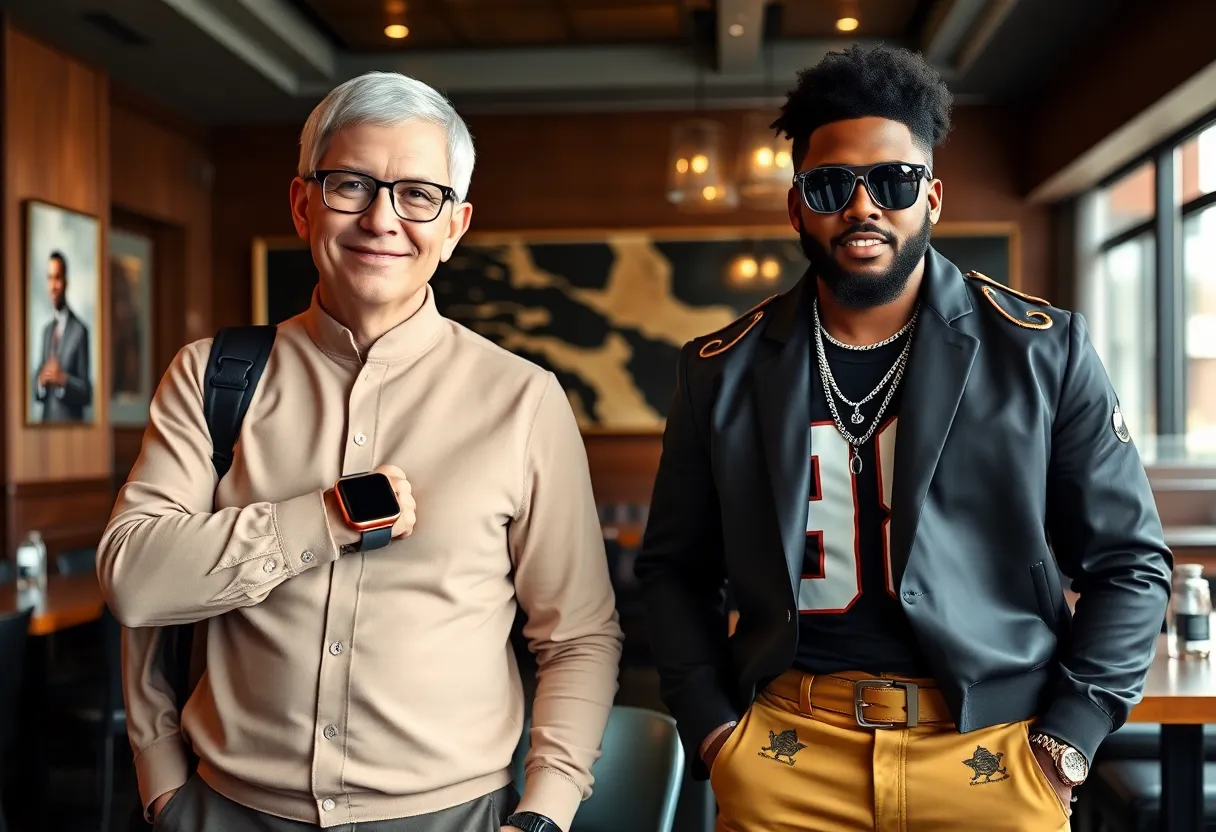News Summary
This weekend in New Orleans, a fashion debate ignited between Apple CEO Tim Cook and NFL star Odell Beckham Jr. Their contrasting styles showcased a larger commentary on billionaire versus millionaire fashion. Cook’s understated look highlights minimalism and subtlety, while Beckham Jr.’s flashy ensemble reflects a trend among millionaires. This conversation extends beyond celebrities, exploring the societal implications of wealth display in fashion.
Tim Cook vs. Odell Beckham Jr.: A Fashion Debate on Billionaire vs. Millionaire Style Emerges Following New Orleans Outing
This past weekend, a fashion duel unfolded between Apple CEO Tim Cook and NFL star Odell Beckham Jr. during a casual outing at a New Orleans restaurant. As they sat down to enjoy their meal, their outfits sparked a lively conversation across social media platforms, highlighting the differences in style between the fashion choices of billionaires and millionaires.
The Outfits
Tim Cook chose a classic look, donning understated pants and a simple shirt, topped off with his signature Apple Watch. His ensemble screamed subtle sophistication – just the kind of look you’d expect from a tech mogul who has built an empire on elegance and minimalism. On the flip side, Odell Beckham Jr. dazzled in a much more eye-catching getup, complete with a watch priced at an astonishing $490,000. The contrast between these two men was stark, with Tim’s conservative style highlighting his billionaire status, while Odell embraced the flashiness often associated with millionaire fame.
Wealth and Fashion Choices
Interestingly, it’s worth noting that Tim Cook’s net worth is approximately 60 times greater than that of Beckham Jr. This brings up an intriguing discussion regarding the societal norms of wealth display in fashion. Many commentators have pointed out that the differences in “billionaire fashion” versus “millionaire fashion” reveal much more than personal preferences. While wealthy individuals like Cook often prefer subtlety, those with less wealth may lean towards more ostentatious signs of success.
This debate doesn’t just end with these two celebrities. The discussion resonates with many as we grapple with the perception of wealth in today’s society. For countless individuals, the difference in net worth might seem minor, but it’s how they choose to display their success that makes all the difference.
Luxury Brands and Middle-Class Consumers
Speaking of displays of wealth, it appears that even luxury brands are being increasingly associated with middle to upper-middle-class consumers instead of just the ultra-wealthy elite. What’s fascinating is that billionaires often do not feel the need to flaunt their wealth through extravagant luxury goods. Their wealth is something that doesn’t rely on visible status symbols.
On the other hand, you find middle-class consumers who can afford luxury items, sometimes buying these goods on credit to project an air of success. The inclination towards flashy designer brands, thus, serves as a subtle commentary on societal status.
Shifts in Luxury Branding
Interestingly, brand analysts have noticed a shift in luxury branding. While many consumers yearn to project wealth, wealthier individuals are increasingly opting for a minimalistic approach. Instead of splashing out on logos and designer pieces, they may prefer simple, understated clothing. This trend symbolizes a larger cultural shift away from traditional ideas of what it means to be fashionable.
On another note, the luxury fashion industry isn’t without its criticisms. From environmental concerns, as the industry contributed to over $2 billion in greenhouse gas emissions in 2018, to reports of worker exploitation in brands like Armani and Dior, the ethical implications of these purchases are coming under scrutiny.
Consumer Awareness and Future Trends
Looking closely at the current market landscape, it seems consumer interest in luxury brands may be declining, evident from falling share prices of prestigious companies like LVMH, Estée Lauder, and Burberry. For many, this drop could serve as an opportunity to reevaluate shopping habits and question the ethics behind luxury brand marketing.
As consumers, we are urged to consider supporting independent artisan brands that prioritize sustainability over the glitz of conglomerate luxury names. By shunning the false exclusivity of designer brands, individuals can form relationships with more ethical companies that focus on quality and responsible practices.
Final Thoughts
In the end, this fashion debate goes beyond just Cook and Beckham Jr. It’s a reflection of our society’s evolving attitudes towards wealth and style. As we navigate the world of fashion, it’s important to remain mindful of the implications of our choices and consider forging a path that champions sustainability and ethics in this colorful, diverse arena.
Deeper Dive: News & Info About This Topic
HERE Resources
Additional Resources
- Daily Free Press
- Vogue Business
- Reuters
- Jerusalem Post
- TheStreet
- Wikipedia: Luxury Goods
- Google Search: Luxury Brands
- Google Scholar: Luxury Fashion Impact
- Encyclopedia Britannica: Luxury Fashion
- Google News: Luxury Brands Debate








